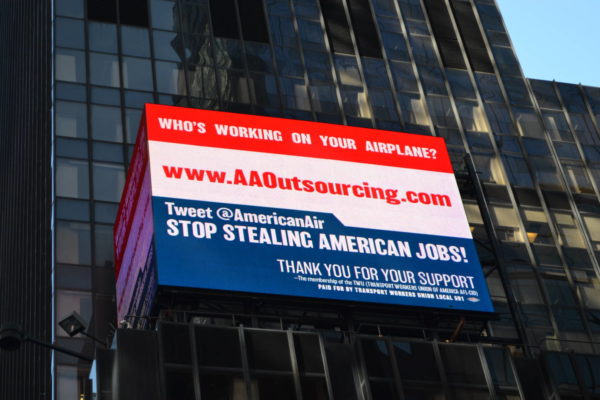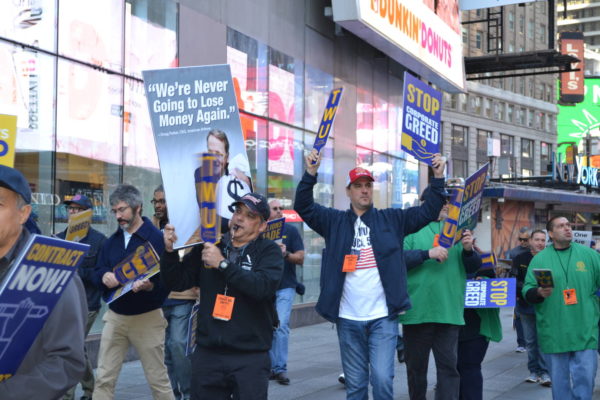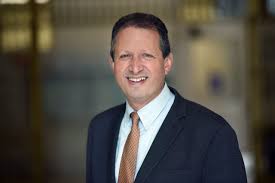FORT WORTH, Tex.—More than three years after American Airlines completed its merger with US Airways, the two unions representing its mechanics have yet to win a first contract—and outsourcing of maintenance work is a major sticking point.

American currently outsources significantly less of its maintenance, repair, and overhaul work than other major carriers—but it wants to increase that. “They’re looking for language that would allow them to outsource the work of thousands of jet mechanics,” says Transport Workers Union President John Samuelsen. “That’s why we can’t get to a contract.”
“American performs more of its maintenance work with its own team members than any other U.S. carrier. Nothing in our proposal seeks to change that,” the company responded in a statement sent to LaborPress. In May, two executives told workers that “no less than 50% of all aircraft overhaul work done for the airline will be performed by TWU-IAM members.”
That language leaves plenty of room for the airline to increase the amount of work outsourced, the TWU argues. According to “The Impact of Offshoring U.S. Aircraft Maintenance to Foreign Repair Stations,” a report the union released in April, American outsources about 38% of its maintenance, repair, and overhaul work, which ranges from routine “line maintenance” tasks that can be done during the layover between flights to overhauls in which systems such as engines and landing gear are taken apart and worn-out parts replaced. Delta outsources 43%, United 51%, Southwestern 52%, and JetBlue 74%.
Almost one-fourth of this work is done overseas, in countries such as China, Brazil, and El Salvador. Practically, says Samuelsen, much of it has to be done in the U.S., but “they’re trying to gain contract language that would eliminate our protections totally.”
The contract would cover almost 15,000 mechanics and 17,000 fleet-service workers. The TWU represented them at American before the merger and the International Association of Machinists at US Airways. A Machinists spokesperson told LaborPress the union was not prepared to comment during negotiations.
Outsourcing of maintenance work spread rapidly in the years after the 9/11 attacks, when airlines were slashing costs and some were declaring bankruptcy. A Federal Aviation Administration report from 2008 said that among nine major airlines, the percentage of heavy airframe maintenance jobs outsourced rose from 34% in 2003 to 71% in 2007.
These airlines view safety as expensive, rather than a necessity. They want to be able to pay people three or four bucks an hour. — TWU President John Samuelsen.
American was not included in those FAA percentages because it then did all its maintenance in-house. The airline, Samuelsen says, was not allowed to outsource any work until 2010, when a bankruptcy judge abrogated the TWU’s contractual protections against it.
In 2000, the TWU report said, U.S. airlines employed 72,000 mechanics, and outsourced 31% of maintenance work. By 2016, they were outsourcing 47% of work, and the number of mechanics had fallen to 51,000.
An increasing share of that work is done overseas—from 7% in 2003 to 19% in 2007 to 24% in 2016, according to the TWU report. Aeroman, at El Salvador International Airport, describes itself as “the industry leader in providing airframe heavy maintenance for airlines in the Americas,” with customers including Delta, Southwest, and JetBlue. Delta co-owns a maintenance facility in Mexico and also does “significant airframe maintenance” at STARCO in China. American announced plans last year to build a $100 million maintenance facility in Sao Paulo, Brazil.
This is dangerous, the TWU argues. In May, a risk assessment it commissioned by former Homeland Security Secretary Tom Ridge’s consulting company noted that while foreign facilities have certificates from the FAA, most of their mechanics don’t; that workers there are not subject to Transportation Security Administration background checks; and that repair manuals may not be properly translated into local languages.

“All work performed for American Airlines outside the U.S. is done at FAA federally regulated repair stations,” American responds. “The U.S. government sets strict guidelines for overseas maintenance facilities and conducts regular inspections. The vast majority of line maintenance work performed overseas is done by American Airlines employees. Ninety-five percent of our overseas maintenance work is done by foreign line maintenance AMTs [aviation maintenance technicians] who are FAA A&P [airframe and power plant] license holders just like our U.S.-based team members. Any of American’s maintenance work completed by a third-party vendor is always subject to American’s and the FAA’s very rigorous safety standards.“
According to FAA figures from November 2017 cited in the TWU’s April report, less than 7% of the 2,400 mechanics employed by American, Delta, and United at Aeroman have FAA certification. At AMECO in China’s Fujian Province, less than 2% of 5,400 do, and at Aerovias de Mexico in Mexico City, about 8% of 637 do.
“Without a requirement that foreign workers be certificated, the current regulations allow lower skilled workers—earning drastically lower wages—to repair U.S. aircraft,” the report said.
While the FAA inspects overseas repair shops, the Ridge report said that doing unannounced inspections abroad is often “either difficult or, in some cases, impossible,” due to the need for permission to enter the country, to get access to the facility, or for approval from local aviation authorities.
“These airlines view safety as expensive, rather than a necessity,” Samuelsen says. “They want to be able to pay people three or four bucks an hour.”
In November, American returned maintenance of most of its almost 400 Airbus A320 planes’ engines to its 5,200-employee Tulsa Maintenance Base in Oklahoma, where TWU Local 514 represents aviation maintenance technicians. Most of that work had been done in Brazil, Malaysia, and Kansas.
But after 34 months of negotiations and bringing in federal mediators, the airline says the two sides “remain far apart on several major issues.”
On outsourcing, “we won’t bend,” says Samuelsen. “We’re not going to let them jump on the bandwagon.”



